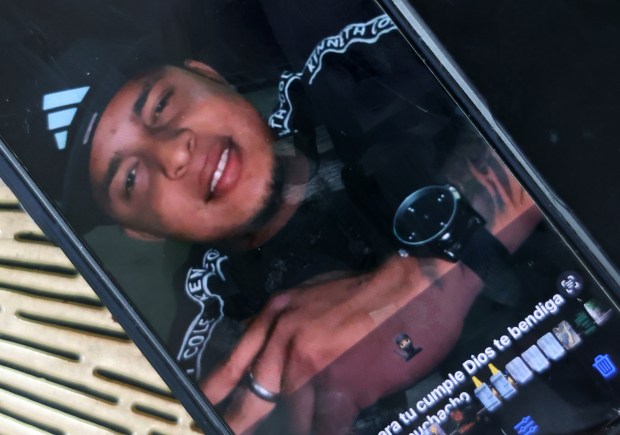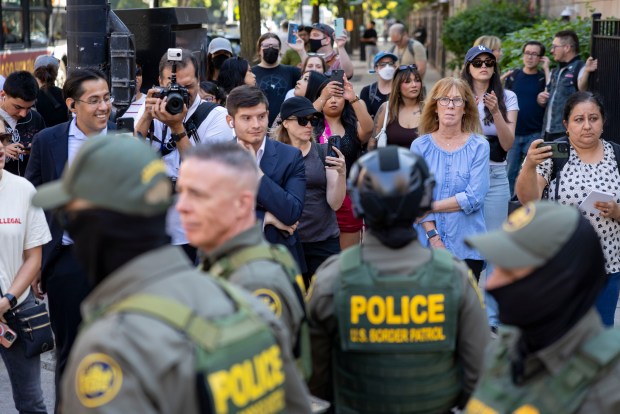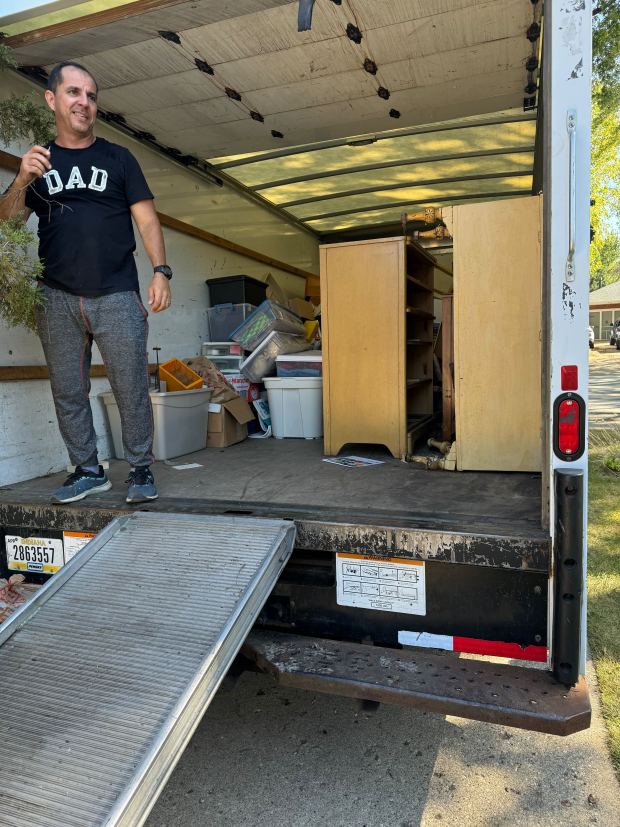On Sept. 21, Darwin Leal turned 24. His family made him a cake, lit it up with candles and sang him “Happy Birthday” over a video call. He was almost 300 miles away, sharing a cell with dozens of people in a correctional facility in western Michigan.
Just a week earlier on a Sunday, the Venezuelan immigrant had been driving in Chicago’s Little Village neighborhood with his wife, 23, and two kids — a 1-year-old boy, Lennyel, and a then-3-year-old girl, Nicolles — on their way to look at a new place they were hoping to move into, when federal immigration agents stopped the car.
 A photo of Darwin Leal on his wife’s phone, Sept. 23, 2025. (Terrence Antonio James/Chicago Tribune)
A photo of Darwin Leal on his wife’s phone, Sept. 23, 2025. (Terrence Antonio James/Chicago Tribune)
“Darwin? Salte del vehículo, estás bajo arresto,” an agent could be heard saying in a video filmed by the wife and later shared on social media. “Leave the vehicle, you’re under arrest.”
“¿Por qué?” the couple asked in unison. “Why?”
“Estás aquí ilegalmente,” the agent replied. “You’re here illegally.”
“¿Cómo que está ilegalmente?” his wife asked. “What do you mean he’s here illegally?”
While Leal didn’t yet have legal status, he had obtained a work permit and he had a court date for his asylum hearing, which was recently moved from 2026 to 2027. Instead, agents put him in handcuffs.
Like Leal, thousands of migrants across the country are going about their lives under the assumption they are exempt from arrest or deportation because of pending asylum hearings, work authorization or Temporary Protected Status applications. But if they entered the country illegally or are without granted status, attorneys say they have no protections from immigration enforcement under a second Trump administration — even as they seek to stay in the U.S. through legal avenues. In fact, they’re even being targeted.
As Leal’s family sought an explanation from immigration agents that day, one of the agents reached for the door handle inside the car from the driver’s side window, which had been rolled down.
After a short tussle over the handle, during which the couple said they wanted to call a lawyer, Leal eventually opened the door. In the video, his wife pleads with the agents in between sobs. “I don’t understand why they do this to us,” she cried out in Spanish. Their children were in the back seat the whole time.
“Lo trataron como delincuente. Me dejaron ahí, tirada, con los niños,” she later told the Tribune. “They treated him like a criminal. They left me behind, alone with the kids.” The Tribune is not naming her because she also fears arrest.
His wife says her husband is a good man who has never been arrested. A search of court records for Cook and collar counties did not turn up any criminal history for anyone with a matching birthday named Darwin Leal. The Department of Homeland Security did not immediately respond to a request for comment.
Emma Melton, an immigration attorney at The Resurrection Project, a community development nonprofit, said she’s heard similar stories in recent months.
“A lot of those folks that were picked up that have pending (asylum) cases or have work permits or are following the steps for some form of relief, are usually just collateral arrests,” she said. “Honestly, it’s really more of: (Federal agents) are going out and they’re just trying to round people up, we think, for the numbers, for show.”
The Trump administration is calling its escalating immigration crackdown in Chicago and its suburbs “Operation Midway Blitz,” with arrests reported and federal agents sighted near local schools, courthouses and workplaces. On Wednesday, the Department of Homeland Security announced that it had made 800 arrests in the area since the mission began at the beginning of September.
The administration is using its “broad federal authority,” Melton said, to detain anyone they believe entered without inspection or doesn’t have a granted status — such as permanent residency, asylum or temporary protection.
On Wednesday, for instance, dozens of federal immigration agents “stormed and raided” a homeless shelter in Chicago’s Bronzeville neighborhood run by Bright Star Community Development Corp., according to a video statement from the organization. According to local Pastor Chris Harris, the people targeted were standing outside the shelter, preparing to head to work — 60% of the shelter’s immigrant residents are employed.
Caryl West, executive director of Bright Star Community Development Corp., said less than half of the shelter’s 260 residents are from the migrant community and among those, “a lot of them have work permits (and) a lot of them are seeking asylum.”
“You might have a work permit, but that’s not status. That’s just permission to work. It’s not a legal status to have filed an asylum application,” Melton said.
Still, in previous years, being involved in such a process meant she could more confidently tell her clients, “You’re doing the ‘right things.’ That makes you a lower priority” to be targeted.
“And I think that was true until this year,” she said. “It’s different in this Trump administration than the first one, because during the first administration, he did release clear priorities for the folks that he was targeting.”
This meant U.S. resources were aimed at targeting noncitizens with any criminal offense, not just serious felonies or multiple misdemeanors; immigrants who had “abused public benefits” or committed fraud; and those who had been ordered to be deported but had not yet left the country.
“Now, everyone is a priority,” Melton said. “Anyone that you know is here, anyone that speaks Spanish, anyone that has brown skin.”
 Federal agents near the Newberry Library in Chicago’s Gold Coast, Sept. 28, 2025, after walking through downtown as part of an immigration blitz show of force. (Brian Cassella/Chicago Tribune)
Federal agents near the Newberry Library in Chicago’s Gold Coast, Sept. 28, 2025, after walking through downtown as part of an immigration blitz show of force. (Brian Cassella/Chicago Tribune)
Last Sunday, as dozens of federal immigration agents patrolled downtown Chicago in a show of force, Chief U.S. Border Patrol agent Greg Bovino told WBEZ they were arresting people based partly on “how they look.”
‘So very frightening’
On Sept. 23, Sarah Mawhorr and three employees from her Chicago-area junk hauling company were driving on Interstate 65 near Lowell in northwest Indiana, on their way to deliver some furniture that had been in storage. She was in her van, following the truck with the men inside.
“It was such a beautiful day. It was such a normal day — until everything was not,” she recalled to the Tribune.
At some point, Mawhorr pulled off the interstate to use the restroom. Once she was back on the road, trying to catch up with the truck, she received a call from her employees: One of them had been detained over his immigration status.
An Indiana state trooper had pulled them over to where a group of plainclothes agents, whom Mawhorr later saw carried no clear identification, waited. One of them approached the men in the truck and addressed them in Spanish.
As opposed to Illinois, where the TRUST Act prohibits state and local law enforcement from assisting with immigration enforcement, in August, Indiana entered into agreements with federal authorities to allow state police to exercise immigration enforcement.
According to her other two employees, Mawhorr said, the third one, Joao Barreto — a 48-year-old from Venezuela and father of two young women residing in a Chicago suburb — replied in Spanish. He came to the United States in 2022 and had been working with Mawhorr since late 2023, which is when he got a work authorization that was good through 2028. At the time, he also applied for Temporary Protected Status, which to this day has not been approved. He also applied for asylum.
 Joao Barreto, a Venezuelan immigrant seeking asylum and living in a Chicago suburb, shown Sept. 21, 2024, after loading up a truck for the junk hauling company he was working for when he was detained by federal immigration agents driving near Lowell, Indiana on Sept. 23, 2025. (Provided photo)
Joao Barreto, a Venezuelan immigrant seeking asylum and living in a Chicago suburb, shown Sept. 21, 2024, after loading up a truck for the junk hauling company he was working for when he was detained by federal immigration agents driving near Lowell, Indiana on Sept. 23, 2025. (Provided photo)
A relative, who asked not to be named for fear of arrest, said, “It looks like they didn’t do it the way the government wanted to,” referring to the asylum application.
But Melton said it’s a common misinterpretation: “Just because someone is detained doesn’t mean that that cancels out their asylum or really means anything about their claim. I know that that, sometimes, is confusing to clients: ‘Oh, maybe my asylum claim isn’t good, and that’s why I’m being targeted.’ It has nothing to do with that.”
“I know that he had work authorization. I know he had a valid driver’s license. And that’s all I need to know to hire him,” Mawhorr said. “They took (him) because he answered in Spanish, because he couldn’t speak English.”
She said Barreto was a talented driver, cooperative, friendly to clients, and stayed sober, which is a requirement to drive a commercial vehicle.
By the time she got to where the truck had been pulled over, Barreto had been taken away. She said law enforcement had no reason to conduct a traffic stop in the first place — ultimately, the truck was given no citations or tickets.
She asked the agents why Barreto was taken.
“He’s illegal,” they said.
“He has work authorization,” Mawhorr said.
“That doesn’t matter,” they said.
“Yes, it does.”
“No, it doesn’t.”
“The Department of Homeland Security is the one who cleared him to work for five years,” Mawhorr told the Tribune. “Now, of course, that was the Department of Homeland Security under Biden. But we are supposed to be following rules, and you can’t just switch up … the moment the administration changes.”
She called the activity and presence of federal immigration agents in the Chicago area a performance, echoing critics who have similarly compared it to “a show” and a “public relations stunt.”
“It’s so sickening. I mean, rule of law, due process — all of that is going out the window. It’s so very frightening,” she said.
“We did a run to Indiana earlier in the summer,” she said. “But I did not take (Barreto) because I was worried about this happening. And then we had to do another run to Indiana, and I thought, ‘Maybe I am too focused on this, I am imagining things. Maybe I’m making this darker than it is.’”
So she talked to him about it.
“He’s like, ‘Nah, no worries.’ He said — in Spanish, but he said to me — ‘No worries, we’ll drive to the moon and back,’” Mawhorr recalled. “I feel like I put him in harm’s way. I had a gut feeling that it was a bad idea.”
But Barreto’s relative said he felt confident and comfortable going about his daily life, and didn’t think anything like this would happen. He had never been in trouble with the police, the relative said.
A search of court records for Cook and collar counties did not turn up any criminal history for anyone with a matching birthday named Joao Barreto.
Barreto was soon transferred to the same correctional facility in Michigan where Leal is being held. He has a deportation hearing set for Thursday.
“He was paying taxes, he was paying rent, he was making car payments, he was paying insurance,” Mawhorr said. “Now he’s not making money, he’s not paying taxes, he’s not paying bills, and we are using our tax money to keep him incarcerated.”
Barreto’s relative said the family came from Venezuela looking for safety, but they don’t feel that anymore.
The 48-year-old is a fighter, family said, but he has expressed feeling overwhelmed and scared.
“He doesn’t want to say it, but I know he’s depressed. He’s really, really desperate. He just wants to go back to Venezuela,” the relative said. “In a different time, he would say, ‘Hey, I’m gonna fight this case. I’m gonna do this and that.’ But he told me, ‘Oh, God, I just want to go home.’”
A surprising test
While she waited for a call back from Leal on a recent weekday, his wife picked at the protective film on her phone. After a few minutes, she peeled it off. Her fingers traced cracks on its surface. It broke the day of the arrest, she said.
 Darwin Leal’s wife holds her son Lennyel, 1, on Sept. 23, 2025, while talking to her husband by phone.(Terrence Antonio James/Chicago Tribune)
Darwin Leal’s wife holds her son Lennyel, 1, on Sept. 23, 2025, while talking to her husband by phone.(Terrence Antonio James/Chicago Tribune)
A mostly untouched plate of chicken and rice sat on the dinner table at a family friend’s apartment, where Leal’s wife and two children have been staying since he was detained. She grabbed a black wallet — her husband’s — and took out identification cards one after another. She placed them on the table, including a real ID, an Illinois driver’s license and a work permit. From one of the slots in the wallet, a blue Ventra card peeked out.
Standing on her tiptoes, Leal’s wife reached the top of a shelf and grabbed several manila folders. One of them, a bright red color, was labeled “papeles“ — papers. They kept a meticulous record of every document they had been given or made to sign, she said.
“Everything is in order,” she said in a quiet voice.
Calling from the correctional facility, Leal told the Tribune that he had felt safe and confident in his immigration status and the fact that he followed the law. He didn’t live with the anxiety of being taken and deported, he said.
“If I knew this would happen, I would have left voluntarily,” he said in Spanish. “Here (in detention), I am wasting my time.”
Leal’s wife came to the United States four years ago with their daughter, who back then was only a few months old, crossing the southern border “por trocha,” she said, referring to an irregular border crossing through unofficial paths, which are often also dangerous. Then she turned herself in to immigration officers.
 At home in Chicago, Nicolles plays with a birthday poster, Sept. 23, 2025, in advance of her fourth birthday. Days earlier, her father Darwin Leal was taken into custody by federal immigration officials. (Terrence Antonio James/Chicago Tribune)
At home in Chicago, Nicolles plays with a birthday poster, Sept. 23, 2025, in advance of her fourth birthday. Days earlier, her father Darwin Leal was taken into custody by federal immigration officials. (Terrence Antonio James/Chicago Tribune)
In 2023, Leal similarly immigrated to the country. He was released on parole by immigration officials and given a court date for an asylum decision next year. For the last two years, he has been the family’s sole provider while his wife cared for their young children at home. Leal also sends money to his mother and a young nephew back in Venezuela, as well as three kids from previous relationships who live in Colombia.
To support that many people, Leal worked a construction job from 5 a.m. to 5 p.m. And, after having dinner and a short rest at home, he’d go out to “work the apps,” his wife said — mostly driving ride-shares and delivering food or groceries.
“Yo no me meto con nadie, yo vivo trabajando. No me he robado ni un tomate, no tengo problemas,” Leal said. “I don’t mess with anyone; I work all day. I haven’t stolen even a single tomato. I make no trouble.”
Still unable to find an affordable immigration lawyer, Leal’s wife has been trying to sell the family’s car. The family is also out hundreds of dollars after a check they were going to cash got lost during his arrest.
“I can’t even leave the house now,” the wife said. Her relatives have advised her not to go outside. “But I say I need to mobilize and find a job. I can’t work while I’m locked away.”
As the couple talked, their daughter hoisted herself over the table’s edge, trying to catch a glimpse of Leal.
“Te amo mucho, papi,” she said. “I love you very much, daddy.” Four days after her father’s birthday, she turned 4.
This week, Leal got a call from his wife. After several days of feeling ill, she took a pregnancy test as they talked. It came back positive.
When she told the Tribune the news on Tuesday, she recounted her husband’s reaction: “He cried, because he’s in there.”
Chicago Tribune’s Tess Kenny, Laura Rodríguez Presa and Madeline Buckley contributed.
